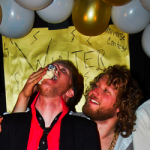photo by Shannon Claire
(Editor's note: This review previews Universe Contest's EP listening party tonight at Duffy's. As part of Dad's Beer Night, the EP will be played twice through, at 11 p.m. and 1 a.m. The EP was self-recorded but mixed at Plan C Recording Studio by Matt Hovanec. RSVP to tonight's event here.)
by Samuel Segrist
It’s 2:15 a.m. on a Tuesday night. Another Dad’s Beer Night is over and 1 million crushed tallboys of Old Style, High Life and PBR are waiting for transport to the Lincoln landfill. The Duplass brothers are in town making a mumblecore film about late twenty-somethings and thirty-whatevers stumbling through life. They’ve chosen Tim Carr, singer of Universe Contest, as their protagonist. Their set is the corner of 14th and O streets.
The scenesters don’t need to go home, but they can stand around smoking cigarettes, eat some Gourmet Grill, and, in good old bottom-of-the-ninth fashion, try to get lucky. After the eventual strikeout, they film Carr, their sandy-blond gentleman of leisure, as he has to make the nightly and epic journey home past our glorious, phallic capitol building, an architectural ode to aspirations and failed dreams.
They cue “Snake Stand,” the opening track of Universe Contest’s four-song EP, Discovering and Deciphering Your Value as a Human Being. The lone guitar woozily echoes back and forth from left to right speaker and back again, simulating the ache of an intoxicated soul. About the time he’s to the giant sprinklers of the capitol lawn, he starts singing to himself: “It’s walkin’ home with the bike seat in your hand / It’s killin’ that snake with the keyboard stand / It’s lyin’ to yourself, to everyone you know, even though you might be right / It’s fallin’ in love with you and then takin’ your friend home at the end of the night.”
Fuzzy guitars and slow, ponderous drums accentuate the melancholy before the song rockets into a dense, atmospheric volley of exotic riffs, chimey guitars, Cure-ish synths, and pounding drum and bass. It becomes a triumph song for those individuals who keep going out night after night, with a spirit of yearning in their hearts.
Sophomore track “Dying” picks up the story the morning after, about when the hangover sets in. This time, the song leads with crazy synths courtesy of John Freidel and with vocal manipulation of what sounds like Carr yelping God’s name while in the agony of death throes. The song goes from a boom-bastic “When the Levee Breaks”-style beat to a broken-heart whisper before expanding, ever-so creepily, from a pulsing bass line to a dance-y explosion, with zany guitars and synth lines vying for attention before a slow fade-out that comes too soon, suggesting that, somewhere, there is a place where the song still lives on.
Penultimate track “Hell Bop” is the most sonically intriguing track of the EP, featuring a dialogue between a vocodered voice and a reverb-drenched vocal, suggesting a schizophrenic episode right before staccato synths bring the groove in. Lush vocals are punctuated by whispers and Carr belting it from a roiling wave of guitars and crashing drums. The rhythm section of Brenton Neville on drums and William Holmes on bass do a fantastic job holding the song together so the adventurous sonic forays always sound cohesive no matter how surprising they may be.
EP closer “Carl Said It First” tells the story of Carr, who after an “adolescent adulthood” of substance abuse and over-consumption, ends up in a mental institution. The song rises and falls before falling to a strummed guitar and a broken vocal about Carr’s condition within the padded room. It paints a picture ready for indie cinema. To hear him tell the story of his padded cell and his experiences with the psychiatric staff is, in his words, “kind of sad, yet delightfully appealing to know you still have some sort of feeling.” The credits are about to roll, but the audience wants the music to play on.
Samuel Segrist is a contributor for Hear Nebraska. He's a member of the band Dude Won't Die, which releases its own CD on March 30 at Knickerbockers. Reach Samuel at samuels@hearnebraska.org.




